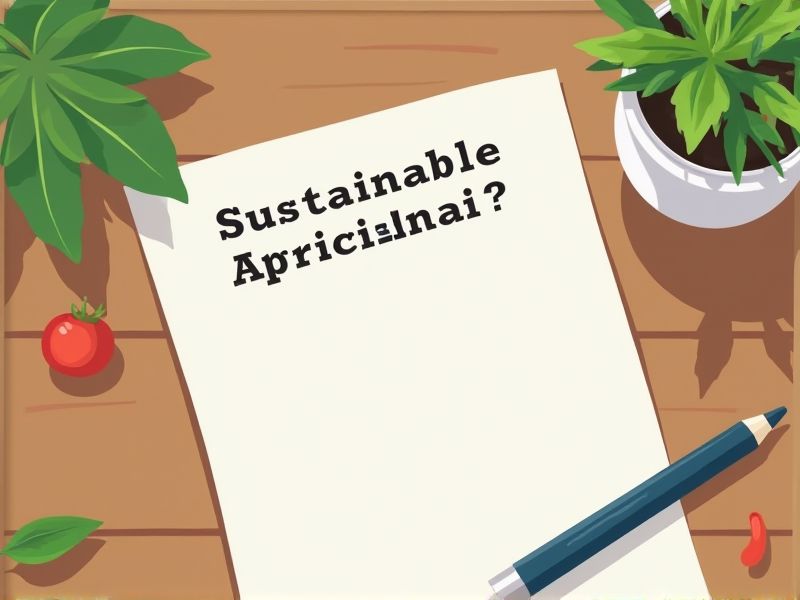
Sustainable agriculture specialists are pivotal in promoting eco-friendly farming practices to ensure long-term food security and environmental well-being. Certifications enhance their credibility, allowing them to implement advanced techniques that boost farm efficiency and sustainability. They encompass vital knowledge in areas like soil health, crop management, and ecological conservation. Key certifications that might be needed for a Sustainable Agriculture Specialist include these essential credentials.
Certified Sustainable Agriculture Professional (CSAP)
Certified Sustainable Agriculture Professionals (CSAP) bring a standardized knowledge base essential for advancing sustainable agriculture practices. Their expertise helps in implementing eco-friendly techniques that reduce environmental impacts. With their skills, they can guide farmers in adopting measures that boost productivity while conserving resources. This certification also fosters trust and credibility among stakeholders, encouraging broader acceptance of sustainable methods.
Certified Crop Adviser (CCA)
A Certified Crop Adviser (CCA) offers specialized expertise that enhances soil health and crop productivity, crucial for sustainable agriculture. The increasing complexity of agricultural systems requires best management practices, which a CCA is trained to implement effectively. Collaboration with a CCA ensures compliance with environmental regulations, reducing long-term ecological impact. Their knowledge in pest management and nutrient cycling aids in promoting resource-efficient farming practices.
Certified Organic Farm Manager (COFM)
A Certified Organic Farm Manager (COFM) ensures adherence to organic agricultural standards, which directly supports sustainable farming practices. By managing resources efficiently, a COFM reduces environmental impact, promoting soil health and biodiversity. Expertise in organic certification processes helps navigate regulatory landscapes, vital for sustaining organic operations. Knowledge integration from a COFM fosters innovation in sustainable techniques, enhancing long-term agricultural productivity.
Organic Farming Certification
Certification ensures adherence to rigorous standards, promoting sustainable agricultural practices. It provides transparency, allowing consumers to trust the integrity of organic products. Certified professionals play a critical role in maintaining soil health and biodiversity. The certification enhances marketability, creating economic viability for organic farmers.
Agroecology Specialist Certification
The Agroecology Specialist Certification provides a structured understanding of how ecological principles can enhance agricultural productivity and sustainability. With certified expertise, specialists can implement practices that reduce chemical dependency and enhance biodiversity, leading to healthier ecosystems. Certification ensures the application of scientifically-backed methods, vital for addressing the evolving challenges of climate change and resource depletion. Training in agroecology equips professionals with practical skills to increase farm resilience, integral for long-term sustainability goals.
Soil Health Management Certification
Soil Health Management Certification enhances a specialist's understanding of soil biology, chemistry, and physics, leading to more efficient agricultural practices. Obtaining this certification ensures the specialist can implement sustainable methods that reduce environmental impact. Certified specialists are equipped to advise on best practices that improve crop yield and soil longevity. Increasing consumer demand for sustainable products makes this credential valuable for staying competitive in the agricultural sector.
Integrated Pest Management (IPM) Certification
Integrated Pest Management (IPM) certification equips Sustainable Agriculture Specialists with essential strategies to control pest populations using environmentally conscious methods. The certification ensures specialists apply best practices in reducing chemical pesticide use, promoting biodiversity, and enhancing ecosystem resilience. It aligns with the growing demand for sustainable farming methods that protect soil health and crop productivity. IPM-certified specialists can effectively guide agricultural operations towards reduced environmental impact and improved long-term sustainability.
Conservation Agriculture Certification
The need for Conservation Agriculture Certification for Sustainable Agriculture Specialists stems from the growing demand for practices that reduce environmental impact and enhance soil health. Certification ensures specialists are equipped with knowledge of sustainable techniques like minimal soil disturbance, crop diversification, and permanent soil cover. Lack of certification could result in ineffective implementation of conservation methods, leading to soil degradation and decreased ecosystem resilience. With certified specialists, agricultural systems can better contribute to food security and climate change mitigation.
Climate-Smart Agriculture Certification
Climate change impacts agriculture through altered weather patterns, drought, and reduced crop yields, necessitating specialized knowledge. Certification in Climate-Smart Agriculture equips specialists with the skills to implement adaptive, resilient farming practices. This expertise helps mitigate environmental impact while ensuring food security for growing populations. Certified specialists guide farmers in sustainable practices that conserve resources and reduce greenhouse gas emissions.
Renewable Energy in Agriculture Certification
The focus on renewable energy in agriculture certification equips specialists with the necessary skills to implement energy-efficient technologies, crucial for reducing carbon emissions linked to agricultural activities. Agribusinesses face increasing pressure to meet stringent environmental regulations, making expertise in sustainable practices a valuable asset. Knowledge of renewable energy systems enables specialists to advise on cost-effective solutions, leading to reduced operational costs and improved energy management. The certification ensures that specialists can design and implement systems that enhance the resilience of agricultural operations against climate-related disruptions.
Summary
When you earn certifications in sustainable agriculture, your credibility in eco-friendly farming practices significantly increases. This newfound recognition often leads to better job opportunities and higher income potential. Your expertise becomes crucial in advising agricultural businesses on sustainable methods, enhancing productivity while minimizing environmental impact. Consequently, you contribute directly to the global movement towards sustainable food systems and resource conservation.
